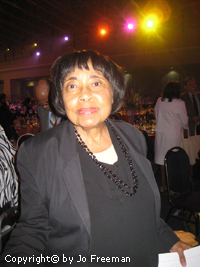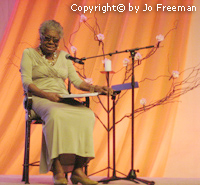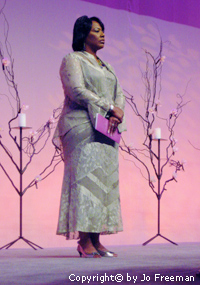Women Were the Foundation of the Civil Rights
Movement
by Jo Freeman
Women were the secret weapon of the civil rights movement. For the most part, the men made the speeches and did the press interviews, and the women did the work. If they hadn’t, all those great plans would not have gotten past the talking stage.
At the luncheon for Women Who Dare to Dream, a part of the MLK memorial celebration, Memorial Foundation CEO Harry Johnson Sr. acknowledged that women’s contributions to the movement were often overlooked.
As more biographies and histories are written, the contributions of women are becoming better known. Ella Baker’s work as a founder of both SCLC and SNCC has finally been acknowledged, as has the importance of Fannie Lou Hamer and Rosa Parks.
But the women who refused to give up their seats on the segregated Montgomery buses before Parks live on only as plaintiffs in the court case that finally resulted in a Supreme Court decision that segregation had to go. The role of the Women’s Political Council in bringing about the boycott has similarly received little attention. And the thousands of women who worked in their own communities to talk their neighbors into registering to vote and other acts of defiance will probably go unrecorded.
Few know that the groundwork for the civil rights movement was laid by the citizenship schools that started in South Carolina in 1954. The idea of teaching adults to read and to fill out the complicated forms necessary to register to vote was taken up by Septima Clark. After she was fired from her job as a Charleston elementary school teacher for the crime of belonging to the NAACP, she ran the program from the Highlander Folk School.
 Dorothy Cotton |
When Highlander was closed by a vengeful State of Tennessee in 1961 for practicing and preaching integration, SCLC picked up the program and brought it to Georgia, where it was placed under a new Director of Education, Dorothy Cotton. Funded with foundation grants and run by women, the Citizenship Education Program brought 10,000 people from all over the South to be trained to teach literacy back in their home counties.
They formed the popular base of the movement — the ones who made repeated trips to the county Board of Registrars. Their willingness to stand in line for hours, endure loss of jobs and homes, and still keep coming back demanding to vote, created the record needed to persuade Congress to pass the 1965 Voting Rights Act.
Of these important women, only Dorothy Cotton, who was in the audience, was recognized at the luncheon. But what she did wasn’t described, and the black woman sitting next to me had no idea who she was.
 Maya Angelou |
There were some excellent speakers, plus an original poem read by Maya Angelou. But what wasn’t mentioned says a lot about how history is remembered.
Much has been made of the fact that Dr. King is the first African-American to be honored with a memorial on the National Mall. True enough, but Mary MacLeod Bethune has a sculpture in Lincoln Park on the eastern side of the Capitol, one of a dozen statues and memorials to African-Americans in Washington, DC.
Nor did anyone note that the luncheon was being held on August 26, the day that the 19th amendment giving all women equal suffrage with men was proclaimed a part of the US Constitution.
 Rev. Bernice King |
Since Mississippi didn’t even ratify the amendment until 1984 — and none of the Southern states did so before 1952 — has anyone given thought to how different the civil rights movement would have been had not a lone Tennessee legislator followed his mother’s advice to vote yes? Could Fannie Lou Hamer, Annie Devine and Victoria Gray have run for Congress in Mississippi in 1964 had Mississippi still not enfranchised any woman?
Rev. Bernice King, the only one of Dr. King’s four children to inherit the preacher gene, gave a stirring tribute to her mother, Coretta Scott, and her importance to his life. She didn’t mention that CSK wanted to do more than be a supportive wife and mother. She was a peace activist as early as 1962. However, like most men of his time and place, Dr. King thought women’s place was in the home so CSK never got to stretch her wings very far.
Copyright © 2011 by Jo Freeman
Books by Jo | What's New | About Jo | Photos | Political Buttons
Home | Search | Links | Contact Jo | Articles by Jo